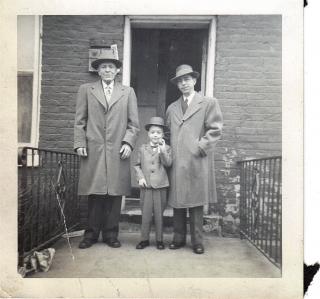Wounds From Our Fathers

Each of us has gifts and wounds from those who fathered us. This is inevitable; even the best fathers in the world disappoint their children sometimes. Otherwise we wouldn’t be able to grow up. But I know that some wounds are deeper than others. Some people’s hearts have been broken by their fathers’ neglect or abuse, or by the absence of good fathering in their lives.
When Father’s Day comes along, while it may be a joyful day for some, it can bring up the pain others carry from painful relationships with their fathers. It can also trigger grief and sadness for those who have lost their fathers or whose fathers’ lives have been diminished from illness or old age. Let this be a day when we can honor our fathers, and also honor our fathering-wounds.
Jane Myers Drew, a psychologist whose father died when she was only a toddler, wrestled with the question of how to recover from fathering wounds. She offers some guidance for healing in her book, Where Were You When I Needed You, Dad? She says that first of all, we must increase our awareness of our father’s impact on us: we must define what we missed from our dad when we were young, and what we received from him. Then, we must get in touch with any hurt and anger we may be holding onto regarding our dad, and make room for expressing our feelings, mourning and letting go of our pain.
When we have honored our feelings, we are able to look again at our father, seeing him as a human being in his own right, and cultivating a deeper understanding of his situation. This will help us to say good-bye to the dad of our youth, and to release any expectations we have that can no longer be fulfilled. Then, we turn to healing the child within, reconnecting with that young part of ourselves who wanted to be nurtured and treasured by a tender father. We try to become our own good father, finding ways to fill in for the experiences we missed with our dad.
Fathering ourselves will be different for each of us. Each of us had unique childhood experiences, different gifts and wounds that we received. For some it may not be simple or easy to undo the damage of childhood. But even if we didn’t receive all the fathering we needed from our biological fathers, or other childhood caregivers, we can receive fathering from others even as adults.
All of us, as adults, can learn to parent ourselves and each other, to share the gifts we received from our fathers and to heal from the wounds of our childhoods. We can adopt father figures to help us learn what we didn’t learn from our own parents. Father figures are those who believe in us, who treat us like we’re special. It might be as simple as a neighbor who teaches us how to wash and wax the car. It might be an art teacher who encourages us to draw or paint, or a friend who listens to our struggles and confusion.
Part of growing up is realizing that our fathers are human beings with gifts and failings. Part of growing up is letting go of needing our fathers to be better than they were. This is easier to do if we realize that we can offer and receive fathering from others. When we can do this, we are also better able to honor the gifts and forgive the wounds we have received from our fathers.
| Date added | |
|---|---|
| Tagged as |